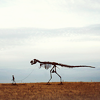But why would I want to go to Zululand? Why should I ever want anything but to live in Botswana, and to marry a Tswana girl? I said to him that Zululand sounded fine, but that every man has a map in his heart of his own country and that the heart will never allow you for forget this map. I told him that in Botswana we did not have the green hills that he had in his place, nor the sea, but we had the Kalahari and land that stretched farther than one could imagine. I told him that if man is born in a dry place, then although he may dream of rain, he does not want too much, and that he will not mind the sun that beats down and down. So I never went with him to Zululand and I never saw the sea, ever. But that has not made me unhappy, not once.
(The entire chapter surrounding Obed's -- Precious' father -- history and life was kind of interesting to read. It's like listening to your grandfather's tale of yonder, his endless stories of how he got here, the pain and suffering he went through, and that small beacon of hope that got him through it and how He Made It, basically. My own parents have a ton of those stories.)
I also really loved how this book asserted women, for the most part. Of course, most Africans have a different culture than ours and women are still seen to have a distinct role in society, but it was really awesome to see people, especially Precious, breaking those boundaries and going into territory specifically designed for men.
I really liked this proverb--
"We are the ones who first ploughed the earth when Mother (God) made it," ran an old Setswana poem. "We were the ones who made the food. We are the ones who look after the men when they are little boys, when they are young men, and when they are old and about to die. We are always there. But we are just women, and nobody sees us."
--because it's something that's happening even today, and I think people forget just how important and vital women are sometimes, doing "thankless" jobs and the such.
Besides that, it's a kind of awesome book where Precious Ramotswe is a lady detective, the first of her kind, and sells her late father's cattle to buy a house and a business and becomes quite successful despite some people's discomfort at her being in that sort of position. Oh, I loved how she kept bringing up Agatha Christie every time someone was like, "But that makes no sense! You are a woman!" Like this--
"Women are the ones who know what's going on," she said quietly. "They are the ones with eyes. Have you not heard of Agatha Christie?"
The lawyer looked taken aback. "Agatha Christie? Of course I know her. Yes, that is true. A woman sees more than a man sees. That is well-known."
"So," said Mma Ramotswe, "when people see a sign saying NO. 1 LADIES' DETECTIVE AGENCY, what will they think? They'll think those ladies will know what's going on. They're the ones."
The lawyer stroked his chin. "Maybe."
"Yes," said Mma Ramotswe. "Maybe." Adding, "Your zip, Rra. I think you may not have noticed..."
SHE'S SO SASSY! I love it. And the whole story with Nandira was the the sweetest thing. She found her real Jack after all! I can't wait to read the rest of the books from this series, just to see if Precious gets her own happily ever after.

No comments:
Post a Comment